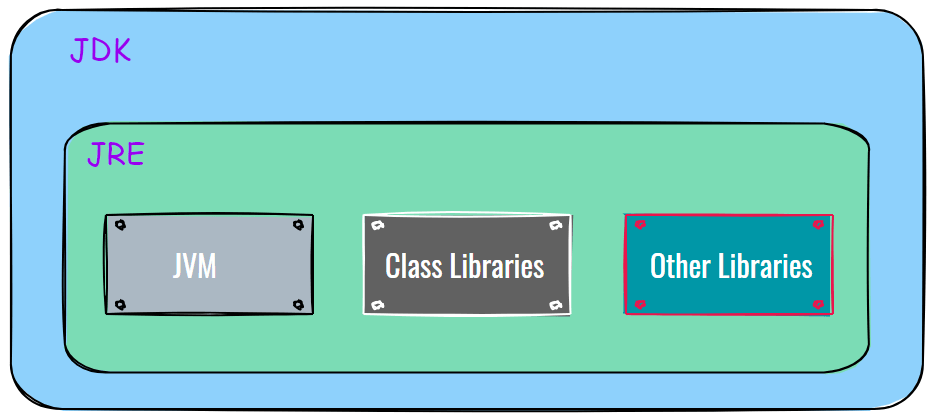What is JDK (Java Development Kit )? In Java, JDK stands for Java Development Kit. It is a software package provided by Oracle (previously Sun Microsystems) that includes tools, libraries, and executables for developing, compiling, and running Java applications.
The JDK comprises several components: the Java compiler (javac), runtime libraries, debugging tools, and various utilities.
In addition to the basic development tools, the JDK includes the Java Runtime Environment (JRE), which is needed to run Java applications on a computer. The JRE has the Java Virtual Machine (JVM) that executes Java bytecode, along with core libraries and resources required for application execution.
Developers use the JDK to write, compile, and package Java code. It provides the essential tools and resources to create cross-platform applications that can run on different operating systems as long as a compatible JRE is available.
What is JDK (Java Development Kit )?
The Java Development Kit, commonly called JDK, is a crucial set of software tools and libraries provided by Oracle Corporation (also available through OpenJDK, an open-source alternative) for developing Java applications.
JDK Architecture In Java
The architecture of JDK in Java includes the following modules, as described in the image below.

Components Of JDK
Here are some key components and aspects of the JDK:
Java Compiler (javac): The JDK includes the Java compiler, which is used to convert human-readable Java source code files (with the .java extension) into bytecode files (with the .class extension). Bytecode is a low-level representation of the code that can be executed by the Java Virtual Machine (JVM).
Java Virtual Machine (JVM): The JDK provides the JVM, which executes Java bytecode on different operating systems. The JVM ensures platform independence by abstracting the hardware and operating system specifics, allowing Java applications to run consistently across various platforms.
Core Libraries: The JDK includes a rich set of standard class libraries that provide fundamental functionality for tasks such as data manipulation, I/O operations, networking, threading, and more. These libraries save developers time by offering pre-implemented solutions for common programming tasks.
Development Tools: The JDK comes with various development tools that aid in creating, testing, and debugging Java applications. Some of these tools include:
- Javac: The Java compiler for compiling source code into bytecode.
- Java: The command-line tool to launch Java applications.
- Javadoc: Used to generate API documentation from specially formatted comments in source code.
- javap: A disassembler that helps examine the bytecode of compiled classes.
- Debugger Tools: Tools like jdb for debugging Java programs.
JavaFX: The JDK includes JavaFX, a framework for building rich Java client applications. JavaFX provides a range of features for creating graphical user interfaces (GUIs) and multimedia applications.
Java Development Environment: The JDK also offers tools and utilities for integrated development environments (IDEs) like Eclipse, IntelliJ IDEA, and NetBeans. These IDEs use the JDK behind the scenes to provide advanced features like code completion, syntax highlighting, and debugging capabilities.
Version Compatibility: Different versions of the JDK correspond to different versions of the Java language specification. Newer versions of the JDK often introduce language enhancements, improved performance, and new libraries. Developers can choose the appropriate version of the JDK based on their project’s requirements and target platform.
Latest Version of JDK in Java
Oracle was the main provider of the official JDK distributions. However, some open-source alternatives of JDK are available, like OpenJDK, AdoptOpenJDK, and Amazon Corretto, which provide similar functionality and may include additional features or improvements.
If you want to check the latest version of JDK, you can check that by visiting the official Oracle website or following the JDK download link.
If you are new to Java, then you can follow the links below to learn:
For the most up-to-date information and details about the latest JDK versions and features, it’s recommended to refer to the official Oracle website or other reliable sources related to Java development.
Conclusion:
The Java Development Kit (JDK) is a software development cornerstone. Java continues to evolve with each new version, such as the latest JDK 21, offering developers enhanced tools and features while maintaining stability.
Its adaptability, extensive library ecosystem, and cross-platform compatibility make it a preferred choice for building various applications, from enterprise solutions to mobile apps. As Java thrives within the open-source community and embraces modern programming paradigms, it remains a reliable and enduring platform for crafting robust and efficient software solutions across diverse industries.
If you have any doubts or questions, I encourage you to engage with us by leaving a comment in the comment section below. Your queries are important to us, and we’re here to provide clear and comprehensive explanations. Don’t hesitate to ask, and we’ll be more than happy to assist you further!
